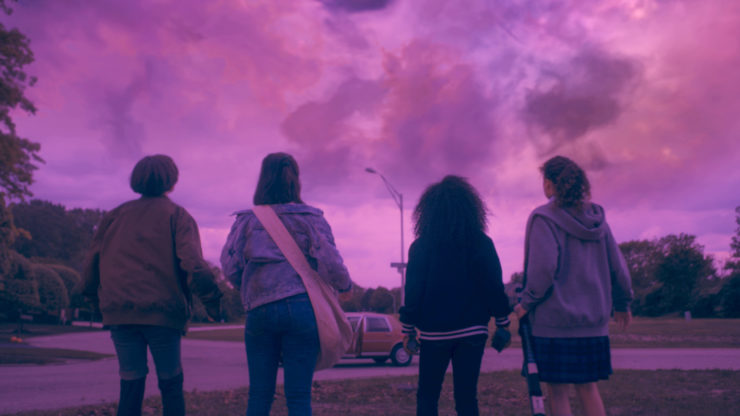When writer Brian K. Vaughan and artist Cliff Chiang began work on their comic book series Paper Girls back in 2015, they had no idea that a version of the story would make it to the small screen. Amazon Studios and Legendary Television, however, eagerly took their material and adapted it into a television series.
I had the chance to talk with Vaughan and Chiang about how the TV adaptation came to be, what it was like for them to see the characters they created on screen, and whether the two may collaborate on another project in the future.
Just a head’s up: This conversation is largely spoiler-free though there is one very minor and somewhat vague spoiler that—if you’re someone who likes to watch things without knowing anything beforehand—may offend your senses.
This interview has been condensed and lightly edited for clarity.
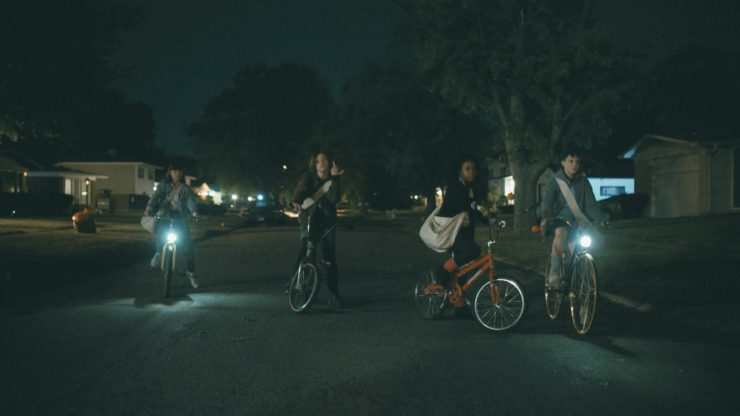
You’ve said before that you didn’t go into Paper Girls thinking it would ever be adapted, and here we are. Can you share how this adaptation came to be?
Brian K. Vaughan: As you said, Cliff and I never imagined this. I think after the success of my other comic Saga, I felt like “Oh, we have some capital to spend—let’s really try and do something ambitious and something that we wouldn’t be allowed to do somewhere else.” To have four 12-year-old protagonists, particularly four female protagonists—I felt like anytime, having come from television, that I tried to pitch a story like that, it was seen as a non-starter for a lot of reasons.
Usually it’s commercial reasons or practical reasons, but it’s like those characters can’t be at the forefront of a TV show. So I went fine, we’re going to tell our story. So it was shocking to us that there was almost immediate interest in turning this into something. And it just came together more quickly than anything I’ve ever been a part of in my life. So yeah, I’m very grateful to have been proven wrong.
And what about getting showrunner Stephany Folsom [who also wrote Toy Story 4 and episodes of the upcoming The Lord of the Rings: The Rings of Power] on board?
Vaughan: Stephany had reached out to me early on as a fan of the comic and had some brilliant ideas about how to help translate it. She was one of the first partners to come on board and was a wildly valuable voice from the very beginning telling me, “Brian, you are wrong—this is a TV series.”
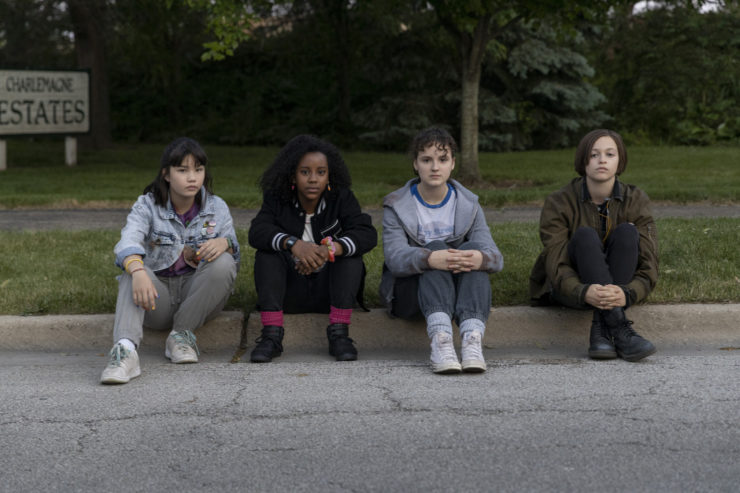
I imagine one of the things that helped make the adaptation happen, at least from the commercial side, is that nostalgia is a big thing right now. That and having child protagonists is something Stranger Things paved the way for other projects. Paper Girls is different though— it doesn’t have rose-tinted glasses on about the ‘80s in the comics or in the show. Was it important to you that those rose-colored glasses stayed off in the adaptation?
Cliff Chiang: Yeah, it was a deliberate decision to try and show the ‘80s as being this really complicated time as opposed to just neon colors and leg warmers and stuff like that. And with the show, they’re able to expand on so many of these ideas. I think it’s valuable for people to look back at the recent past or maybe not-so-recent past with a critical eye and say, “You know, things maybe weren’t as great as we remember them because we were just kids then.” We’re still grappling with a lot of the same issues and on some other fronts, we may have made some progress. I think it’s also important to know that things can move forward as well.
I thought the casting of the girls is phenomenal and I also loved how the show has even their outfits come straight out of the comics. What was it like for you to see these characters you created on-screen embodied by these actors?
Chiang: The show really valued the comics so much and they really tried to honor the work that we did, and also at the same time, take it to new places. Seeing the wardrobe, seeing the locations, and seeing that the props and everything were done with such care and detail and respect for the comic really meant a lot to us. And then, on top of that, seeing where, they added things and added emotional moments to the characters’ journeys that we weren’t able to fit into the comic or that we hadn’t thought of, and seeing those and being pleasantly surprised by them was maybe the best part.
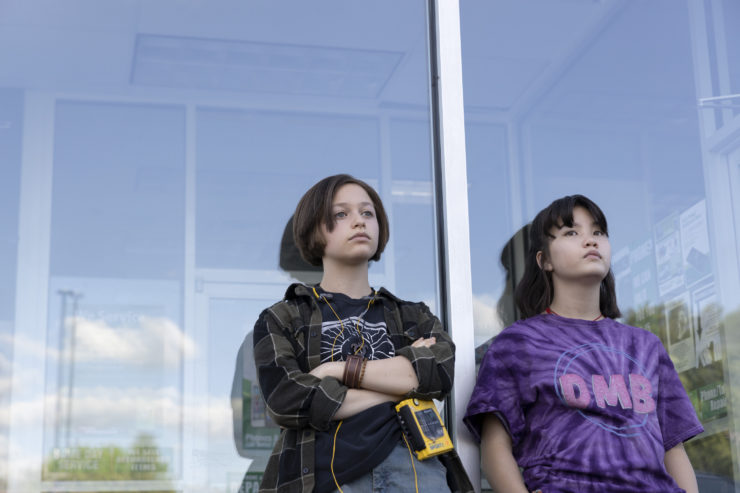
Can you share any specific changes or surprises with the adaptation that you were particularly excited about?
Vaughan: For me, it was always character-based—it’s exhilarating to see a moment perfectly captured from the comic book, but it’s much more exhilarating to see something that we hadn’t done and thought to do. Particularly Mac and her adult brother—I think those scenes are extraordinary. He’s a character hinted at in the comic—he exists as part of Mac’s life, but I wish we had thought to do some of the things they had done. It just brings so much to the story. It’s an example of why adaptations are worthwhile— to do something that’s not just like, “Oh, here it is beat for beat from the comic.” This is something that’s richer in the real estate of television because you have so much more time to explore. He’s one of many examples where the show just handled it beautifully and captured the tone and spirit of the comic, but really expanded it in ways that we approve of wholeheartedly.
Cliff, you’ve said before that your wife was your inspiration for drawing older Erin, who is played by Ali Wong on the show. What was your reaction to seeing Ali take on that character?
Chiang: It’s great casting right? She’s great, and to see Ali go into this dramatic area—we know her so well through her comedy and to see her range here, she’s really perfect and she’s someone who the audience knows well, in a certain way, but then we’re able to see her in a new light. It was like all the other casting on the show, just really pitch perfect.
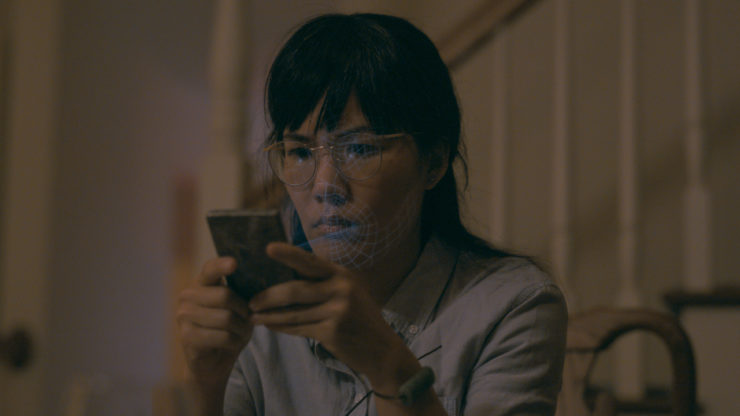
I know both of you are busy with your own projects, but is there anything you can say about any potential collaborations between the two of you in the future that you can share?
Vaughan: It’s been such a pleasure to get to hang out more with Cliff now. We worked so intensely together for years on Paper Girls, and then it ended, and we just don’t get to see or talk to each other as much. Junkets like this remind me that I really miss Cliff and I would like to work with him again. It’s a nice thing about comics—you get to take a break and collaborate with other people. Or if you’re Cliff, you show the world that you don’t need any collaborators and that he is a better writer than I am. So I think that the biggest challenge now is can I convince Cliff to cut his paycheck in half to come work with a lowly writer again, he doesn’t need it. But anytime Cliff would like to I’ll be there for him.
Paper Girls is available on Prime Video.










